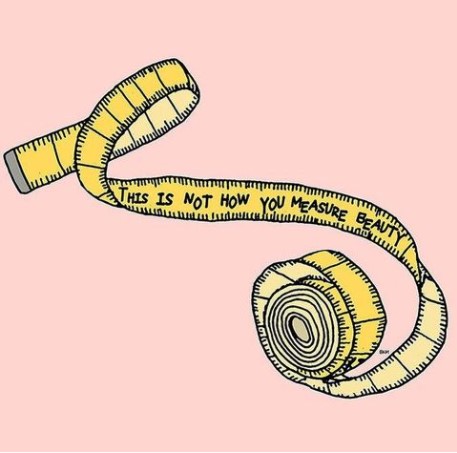In this article, a woman expresses how diet culture within her family and an introduction to dieting at an early age negatively impacted her relationship with food and her body.
Q: Tell us about how your relationship with your body and/or eating habits first began to change. What stage of your life were you in? What major events played a role?
A: I was in grade 11 and age 16 when my mother put me on a diet. I was an average height and weight. My mom did not accuse me of being overweight nor did she say anything negative about me or my body. She said it was just to be “healthier.” This was when the Atkins diet was really popular. She gave me a book about the diet that focused on what I could and couldn’t eat, and all the food had numbers attached to it. I was to follow this diet during the week, and then on weekends I could relax with my food choices. This began my binging/restricting cycle I was in for the next 15 years or so.
It got progressively worse as I experienced different life stages. I began to see myself as the food I was eating. If I ate a salad, I was good. If I ate some potato chips, I was bad. I began obsessively weighing myself, congratulating myself if I weighed a “good” number or if I weighed less than before. I shamed myself if I was a “bad” number or I weighed more. Although my mom introduced the diet out of love and had good intentions without saying negative things about me, it was her actions and messaging behind them that I internalized and made me believe otherwise.

Q: How did your environment play a role in your journey?
A: My mom, too, was dieting. It was what I saw in my household and what I believed I had to do. My mom was also a perfectionist and was such a hard worker who never took breaks or had time for self-care. I observed this and became similar. I did everything perfectly, including my food intake, until I couldn’t and would “mess up” my diet. In which case I would hate myself for what I had done. My mom would never show herself grace or self-compassion, so neither would I.
Q: What were changes in your thoughts, feelings, or behaviors that you noticed during this time?
A: Sneaking food, hiding food, intense restriction coupled with intense binging were some behaviors. I began to be very rigid in my thinking about food, about myself, and about where my life was headed. I saw food as either morally good or morally bad. There was never anything in between. I saw myself and my body as different, like my body worked different than other people’s bodies. For example, my friends could eat what they wanted to but I couldn’t – because I had rules.
Q: Did your relationship with loved ones change in any way during the early stages of your journey? If so, how?
A: I would have to say that it didn’t change in the beginning for the first few years. I was so good at hiding and denying anything was wrong and I also was too young to know any better. I truly thought I had control of myself and my life, and to some extent, I did. It was also such a slow and steady decline that I was able to maintain my friendships, my academics, and my employment that I felt like I had tricked my body and my mind into harming it – and I allowed for it to do so. I also thought my body could handle what I was doing to it. It wasn’t until a few years later where it felt like my body and my mind just gave out that the deterioration really did me in.
Q: What did loved ones do to support you that you found helpful or what kind of support do you wish you had received?
A: I wish I had received treatment and interventions much, much earlier. I wish my doctor could have recognized the signs and asked more questions and had more knowledge of eating disorders and mental health treatment and services, and how to support me as a patient. I think that would have made a world of difference. I would have gotten my life back so much earlier.
Q: What resources or types of support did you find most helpful during this time?
A: My first counsellor was awesome – she specialized in eating disorders. Then my doctor finally told me, thirteen years later, about the VCH eating disorders program. This program saved my life. I cannot say enough good things about it. All of the staff are incredibly knowledgeable, supportive and skilled, and the groups they have have helped me heal in so many aspects of my life that were previously so damaged. I owe my life to this program!
Q: What kinds of self-directed behaviors did you find helpful?
A: All of my coping skills I learned from the VCH eating disorders program. The way I talk to myself is so different now. I’m so much more nurturing and self-compassionate. When I was really struggling, I would do those adult coloring books. Also, my dog is the best so he has been a big part of my recovery.



